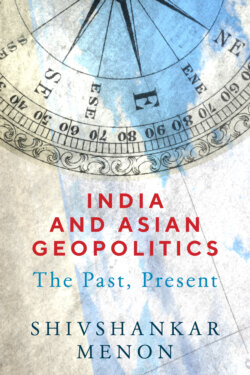India and Asian Geopolitics

Реклама. ООО «ЛитРес», ИНН: 7719571260.
Оглавление
Shivshankar Menon. India and Asian Geopolitics
Contents
Acknowledgments
Introduction
1. The Stage and Inheritance
2. Independence
3. Cold War Asia
4. The Sixties
5. Coming of Age
6. Hard Times
7. The Dam Bursts
8. The Globalization Decades
9. What Globalization Did to Asia’s Geopolitics
10. Viewing Asia from India
11. China Rising
12. India and China
13. India’s Tasks
Afterword. India’s Destiny
Notes. Introduction
Chapter One
Chapter Two
Chapter Three
Chapter Four
Chapter Five
Chapter Six
Chapter Seven
Chapter Eight
Chapter Nine
Chapter Ten
Chapter Eleven
Chapter Twelve
Chapter Thirteen
Afterword
Index
Отрывок из книги
INDIA AND ASIAN GEOPOLITICS
THE PAST, PRESENT
.....
That era of truly global integration came to an end after the First World War and arrived hand in hand with the decline and ultimate collapse of the India-centered Indian Ocean British imperial system.18 Indians too lost faith in the British empire, from Ranade to Gandhi to Gokhale, and moderates in the Indian freedom struggle were disenchanted, eclipsed, or discredited. British favoritism to the white Dominions (Canada, Australia, and South Africa), discrimination against Indians in white settler dominated states, and the treatment of Indian indentured labor in British sugar colonies outraged Indian sentiment. Over roughly eighty years, from 1840 to 1920, a total of just over 1.3 million Indians went overseas as indentured laborers. A beleaguered Britain reverted to the narrower imperialism of race, which revealed for all to see the racial hierarchies and institutionalized violence that sustained colonialism.
Until 1914 passports did not exist as a confirmation of citizenship, and where similar documents were produced, their use was often not enforced. Within the British empire, restrictive immigration policies were first enunciated by the British colony of Natal in South Africa in the mid-1880s, and these in turn inspired similar restrictions in Australia and Canada after 1900. In India a reluctant Raj government implemented a passport officially certifying that its holder was “Indian” by the 1920s. It might get a reputable holder temporary entry into Australia, but there was no longer the concept of an “imperial citizen.” World War I brought increased surveillance of travelers and the enforcement of passport regulations in Europe as well as in India. Codified in the Indian Passports Act of 1920, the restrictions were justified in the name of keeping out “mischievous persons,” Bolsheviks, and revolutionary conspirators.
.....